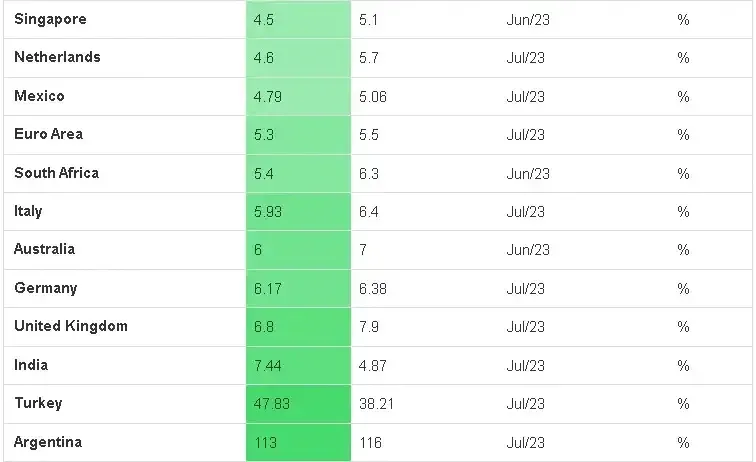By now, you
would have been more conversant with the word “CPI” and “inflation”. This is because of how the consistent rise in
the inflation report has impacted your income over time. Inflation has continued to bite harder as the
economic outlook remains negative, especially for those of us in Nigeria. The aim of this post is not to repeat the
figures which you already know, but, to dissect 7 ways how the high inflation
and slow economic growth affect your income and the economy and what you can do
to stay afloat in the crisis and uncertainty.
Recommended For You:
- Survival Strategy In Time Of Economic Uncertainty: 2 Things You Must Do
- Survival Strategy in A Time Of Economic Uncertainty: 2 Things You Must Avoid
Inflation Reports
In Nigeria: According to the National Bureau of Statistics, Nigeria [NBS], the annual inflation rate in Nigeria jumped by 1.29% [129 basis points] when compared to the 22.79% recorded in the previous month to 24.08% in July 2023. This is making it the sixth consecutive rise and the highest since September 2005, which stood at 23.7%. The biggest upward contribution came from the cost of food and non-alcoholic beverages (26.98% vs 25.25% in June), namely oil & fat, bread & cereals, fish, potatoes, yam & other tubers, fruits, meat, vegetable, milk, cheese and eggs. Compared to the previous month, the Consumer Price Index [CPI] soared 2.9%, after a prior 2.1% hike in June. Additionally, the core inflation, which excludes volatile items, rose slightly to 20.8% in July on a year-on-year, from 20.3% recorded in June.
In Russia: Despite the Russia-Ukrine war, the annual
inflation rate in Russia only rose to 4.3 per cent in July 2023 from 3.3 per cent in
June, the highest in five months and in line with market expectations. The
central bank indicated its intention to potentially raise interest rates this
year with the aim of bringing prices back to its 4% target by 2024 as it
predicts that inflation will likely reach 4.5%-6.5% by the end of this year.
Prices rose faster for food (2.2 per cent vs 0.2 per cent in June) and non-food
products (2.3 per cent vs 1.1 per cent). On the other hand, services inflation
slowed to 10 per cent from 11 per cent. Meanwhile, core consumer prices rose at a
faster pace (3.2 per cent vs 2.4 per cent). On a monthly basis, consumer prices
went up 0.6 per cent, following a 0.4 per cent increase. source: Federal StateStatistics Service
In the US: According to the U.S. Bureau of Labor Statistics, the annual inflation rate in the
US accelerated to 3.2% in July 2023 from 3% in June, but below forecasts of
3.3%. It marks a halt in the 12 consecutive months of declines, due to base
effects. A year earlier, inflation had started to fall from its peak of 9.1%. Meanwhile,
core inflation which excludes food and energy eased to 4.7% from 4.8% in June,
below expectations of 4.8%.
Real wages
adjusted for inflation increased 0.3% on the month and were up 1.1% from a year
ago. Whereas inflation has come well off the 40-year highs it recorded in
mid-2022, it is still a far cry from the 2.0% just where the Federal
Reserve would like it
In China: China's consumer prices
dropped by 0.3%% yoy in July, the first decrease since February 2021, compared
to a flat reading in June and market estimates of a 0.4% fall. The cost of food
fell 1.7%, after rising in the prior 15 months amid a plunge in pork prices.
Meantime, non-food prices were flat after falling 0.6% previously, with the
cost rising for clothing (1.0% vs 0.9% in June), housing (0.1% vs flat
reading), health (1.2% vs 1.1%), and education (2.4% vs 1.5%); while prices of
transport continued to fall (-4.7% vs -6.5%). China's statistics agency said a
fall in CPI will only be temporary, and inflation is projected to pick up
gradually as the impact of a high base last year will fade. Core consumer
prices, which exclude prices of food and energy, went up 0.8% yoy, the most
since January, after a 0.4% gain in June. On a monthly basis, consumer prices
unexpectedly rose by 0.2%, beating forecasts of a 0.1% decrease and marking the
first rise in 6 months. source: National Bureau of Statistics of China
In the UK: Consumer
price inflation in the United Kingdom dropped to 6.8% in July 2023 from 7.9% in
June, pointing to the lowest level since February 2022 and matching market
consensus, mainly due to a slump in fuel prices. Additionally, the core rate,
which excludes volatile items such as energy and food, was at 6.9 %, unchanged
from June's reading but remained outside the Bank of England's 2.0% target,
providing the central bank with room to continue the ongoing policy tightening
path. Transport prices declined further (-2.1% vs -1.8% in June), pressured by
a 24.9% slump in the cost of fuels and lubricants. There were also notable downward
effects from food and non-alcoholic beverages (14.8% vs 17.3%), furniture and
household goods (6.2% vs 6.5%), and recreation and culture (6.5% vs 6.7%). and
miscellaneous goods and services (6.0% vs 6.5%). On a monthly basis, consumer
prices fell by 0.4%, the first decline since January, compared with consensus
of a 0.5% decrease and after a 0.1% rise in June. source: Office for National Statistics
In India: Retail price inflation in
India jumped to 7.44% in July 2023, the highest since April 2022, compared to
an upwardly revised 4.87% in June and market forecasts of 6.4%. Food inflation
surged to 11.51%, the highest since January of 2020, led by the cost of vegetables
(37.3%), spices (21.6%), cereals (13%), pulses (13.3%) and milk (8.3%).
Meanwhile, prices of fuel and light went up 3.7%, housing cost rose 4.5%,
miscellaneous increased 5.1% and prices for clothing and footwear surged 5.6%.
The Reserve Bank of India targets inflation at 2-6% but aims to bring it to the
mid-point of 4%. July marks the first month since March inflation stays above
the upper limit of the central bank target, as irregular monsoon patterns
across the country led to a spike in food prices. Source: Ministry of Statistics and Programme Implementation (MOSPI)
See how
other countries fared in the pictorial representation below:
 |
| Source: Trading Economics |
What is Inflation?
As you can
see from the reports above, inflation is the general rise in the prices of
goods and services over time. It affects the economy in various ways, depending
on its rate and causes.
7 Ways High Inflation Affects Your Income and the Economy
Here are
some of the main effects of inflation:
1. It reduces
the purchasing power of money, meaning that consumers [you inclusive] will now have to buy
less with the same amount of money. For Nigerian food, inflation is as high
as 26.98%.
2. It erodes
the value of savings, pensions, and bonds, which are fixed in nominal terms and
do not adjust for inflation. Saving money used to be the smart thing to do but in today's economy, it seems to be the dumbest thing to do. We highlighted 3 things to do to get ahead in times of economic uncertainty such as this in this article: 3 Powerful Secrets to Changing Your Money Blueprint for Financial Freedom
3. It
increases the cost of production for businesses, which may have to pay more for
inputs such as raw materials, labour, and energy. Whether you are an entrepreneur, investor or an employee this affects you also, especially as an employee. The aim of every business is profit making and if the cost of material eats into the operational expense of a business it will definitely result in salary reduction and downsizing. Notwithstanding the higher cost of living, the come does not increase proportionately but in most cases reduced due to job losses.
4. It creates
uncertainty and reduces confidence among consumers and businesses, who may
postpone spending and investment decisions due to price volatility. This leads to low patronage for local businesses and the resultant effect is closing down or downsizing.
5. It affects
the balance of trade, as domestic goods become more expensive relative to
foreign goods, reducing exports and increasing imports. This is in a case where the high inflation is local.
6. It
influences the monetary policy of the central bank, which may raise interest
rates to curb inflation and stabilize the currency.
7. It can lead to insecurity and unrest when the people begin to steal from others to survive or public disobedience and riots.
Is Inflation Bad For the Economy?
Inflation
is not always bad for the economy. A moderate and stable rate of inflation can
stimulate economic growth, encourage spending and borrowing, and prevent
deflation. However, when inflation is too high, too low, or too volatile, it can
have negative consequences for the economy and society.
We will appreciate your feedback
Good luck!
Recommended Article:
Genetic Engineering: How Your Gene Can Make You Rich or Poor















.webp)


0 Comments